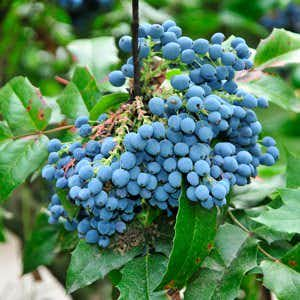
Oregon grape, also known as Barberry, B. vulgaris, was highly regarded as a useful and even necessary herb in Europe from Elizabethan times and through the eighteenth century. The English settlers brought it with them to America, where they extended the name and reputation of barberry to natives of the west and Northwest.
These handsome hollylike plants were originally thought to be species of Berberis but were later determined to belong in their own genus, Mahonia. They all belong to the same plant family.
European barberry was believed to be good for the digestion, especially for the liver and gallbladder.
In America, barberry (European or American) was used for diarrhea and dysentery and considered useful for a range of digestive problems. Its common names include woodsour, sowberry, sour-spine, and pipperidge bush, as well as jaundice berry from the yellow color of the wood.
The active ingredient berberine, along with other alkaloids, imparts the yellow color. Berberine is a constituent common to Berberis and Mahonia species as well as to goldenseal, Hydrastis canadensis.
Oregon grape, which is easily cultivated, has been suggested as a substitute for goldenseal, which is often difficult to find, and has been listed as endangered. Both plants contain berberine and both were used by American Indians.
Oregon grape was said to be helpful in improving the appetite and counteracting general weakness.
Although the purplish berries are edible and rich in vitamin C, the part of the plant used medicinally is the root.
Active Ingredients
The principal constituents of Oregon grape responsible for its activity are the isoquinoline alkaloids, especially berberine, berbamine, isocorydin, and oxyacanthine.
A number of other alkaloids are also present in smaller quantities, to make up a total alkaloid content of almost 3 percent of the root.
Uses
Oregon grape was utilized to treat heartburn, ulcers, and other digestive disorders. There has been little if any modern research to determine a scientific rationale for these traditional uses.
Berberine has antibacterial activity against such important germs as E. coli and N. meningitidis, among others.
In one study, berberine proved effective in treating diarrhea due to toxic pathogens such as cholera. Patients with diarrhea not due to cholera benefited no more from berberine than from placebo.
In a different study, berberine was more helpful than placebo against giardia infections in children.
This compound acts against both amoebas and trypanosomes, medically significant parasites.
Berberine has sedative and anticonvulsant properties. It can also stimulate uterine contractions.
Berbamine has been shown to lower blood pressure. Oregon grape is hardly ever used for these purposes, however, even in herbal medicine.
In Europe, Oregon grape is used topically to treat psoriasis. It is also found in certain homeopathic medicines for psoriasis and dry skin rashes.
Dose
No standard dose of Oregon grape is established.
Special Precautions
Pregnant women should avoid Oregon grape because of evidence that berberine can stimulate uterine contractions in animals.
Adverse Effects
Too much Oregon grape produces diarrhea, kidney inflammation, and undesirable psychological effects of daze and stupor.
Possible Interactions
With its sedative and anticonvulsant properties, Oregon grape probably should not be combined with medicines such as alcohol, barbiturates, or antianxiety drugs such as Ativan (lorazepam) or Xanax (alprazolam).
Because Oregon grape and goldenseal contain such similar ingredients (especially berberine), using them together is irrational.

